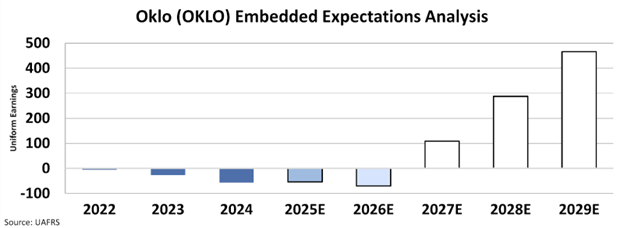The new nuclear directive could cause this company’s earnings to skyrocket

The U.S. government is pushing a major energy shift with new executive orders, declaring a national energy emergency, fast‑tracking reactor approvals, and rebuilding uranium supplies.
Oklo (OKLO), which builds small modular reactors (SMRs), stands to benefit as these compact, factory‑built reactors fit perfectly with rising AI‑driven power demand and plans for SMRs on federal lands and military bases.
The company’s Aurora design is already under review, with agreements to power AI campuses, yet the market values it as if it will capture just 1% of the current $39 billion U.S. nuclear industry.
With strong federal backing, regulatory reform, and scalable technology, Oklo is positioned to grow far faster than traditional nuclear players.
Investor Essentials Daily:
Friday News-based Update
Powered by Valens Research
This year, President Trump signed a sweeping set of executive orders that could change the future of American energy.
The directives include a national energy emergency declaration and a mandate for the Nuclear Regulatory Commission to streamline new reactor approvals within 18 months.
The orders also instructed the Department of Energy to rebuild domestic uranium supplies.
This is a full-on mobilization of federal energy strategy… and the move couldn’t come at a more critical moment.
Electricity demand from AI data centers is skyrocketing. Grid operators are warning of multi-gigawatt shortfalls.
In short, Washington needs fast, scalable energy solutions. And that’s great news for one nuclear-energy company in particular.
Oklo (OKLO) specializes in what’s called small modular reactors (“SMRs”).
SMRs are more compact, cheaper, and faster to construct than conventional reactors. They’re also getting more and more common in the United States.
Trump doesn’t just want to speed up reactor approvals and stock up on uranium. He’s also calling for the development of SMRs on federal lands and military bases.
That’s exactly what Oklo is doing. Its SMRs are designed to be mass-produced, factory-built, and ready to plug into high-demand areas. They’re a perfect fit for hyperscale AI campuses and remote industrial operations.
The company’s flagship design, the Aurora reactor, is already under regulatory review. Once approved, it plans to use Aurora to supply power to a large-scale AI campus.
Oklo also has multiple other deployment agreements in place, including one tied to powering AI infrastructure.
This tech could be exactly what the U.S. government needs. Yet, the market is treating this business like nothing more than a science project.
We can see this through our Embedded Expectations Analysis (“EEA”) framework.
The EEA starts by looking at a company’s current stock price. From there, we can calculate what the market expects from the company’s future cash flows. We then compare that with our own cash-flow projections.
In short, it tells us how well a company has to perform in the future to be worth what the market is paying for it today.
Oklo hasn’t turned a profit to date and that’s a bit of a problem…
But it also has some of the most promising nuclear technology out there. And Trump’s latest moves make it clear that a nuclear renaissance is coming.
Nuclear power is already a $39 billion industry in the U.S. But the market expects Oklo to capture less than $500 million in earnings by 2029.
That’s just about 1% of today’s industry, without factoring in potential market growth.
Oklo doesn’t need decades-long mega projects to start turning a profit. Its model is much more efficient.
That makes it a perfect fit for today’s fast-track regulatory agenda. It should improve much faster than legacy players.
SMRs offer a clean way out of America’s energy squeeze. They don’t require massive grid overhauls. They’re compact and easy to dispatch
And now, they’re becoming a federal government priority. This is the world Oklo was built for.
We’re seeing fast-moving regulatory reform, strong White House backing, and real-world demand from the most power-hungry sectors in history.
Traditional nuclear power is notoriously slow and expensive. Oklo is neither. We can expect big improvements from this maker of pint-sized reactors.
Best regards,
Joel Litman & Rob Spivey
Chief Investment Officer &
Director of Research
at Valens Research





